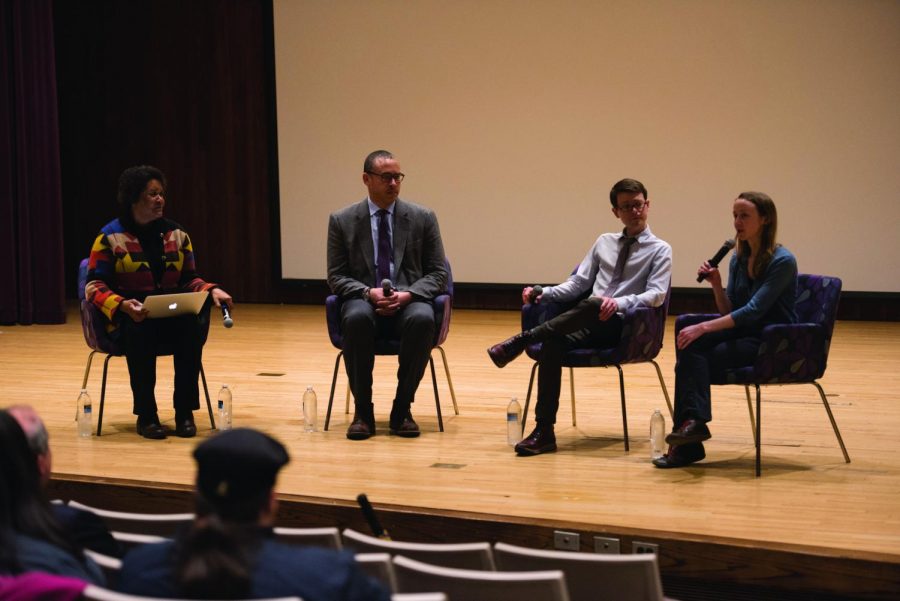Holloway, documentary directors discuss importance of studying lynching
A panel including Provost Jonathan Holloway discusses “An Outrage,” a film on lynching in the American South. Holloway said violence was a response to black people receiving opportunities during the Reconstruction Era and for “not behaving” in the eyes of white people.
February 20, 2018
In the documentary “An Outrage,” Provost Jonathan Holloway said it’s important to remember the history of lynchings in the Jim Crow South because the pain and memory carry on for generations.
“Being forgetful — truly forgetful — is a luxury that whites could afford but blacks couldn’t,” Holloway said in the documentary. “And if you have that luxury, the problem is the system could keep repeating itself because no one remembers.”
The documentary, screened Monday to an audience of about 60 in Norris University Center, seeks to tell the history of lynchings in the American South from the perspective of descendants, community activists and scholars. The 33-minute documentary was followed by a panel discussion with Holloway and the film’s two directors, Lance Warren and Hannah Ayers.
The film builds off of the statistics in a report by the Equal Justice Initiative, which found that more black people were lynched than previously thought. Warren said he originally planned to use only one story, but expanded the narratives after seeing that no lynching was typical and that there was a “disgusting diversity” between instances.
Holloway, a scholar on black history, said lynchings emerged after the Civil War because white people viewed former slaves as a threat to their economic well-being. Violence was a response to black people receiving opportunities during the Reconstruction Era, he said, and for “not behaving” in the eyes of white people.
Tanikka Mitchell, the coordinator of research programs for the Office for Sponsored Research, told The Daily that Holloway’s analysis resonated with her, adding that the desire for domination largely fueled racism and racial violence.
“There’s perpetual fear among the dominant race that makes them feel that they need to have an unfair advantage over other races in order to survive,” Mitchell said. “That perpetual fear drives that unorthodox and unnatural behavior.”
The film also draws links between the public killings of black people today, noting the recorded deaths of unarmed black boys and men at the hands of police officers strike an uncomfortable similarity to the past.
“There’s a reinstitution of publicly recorded displays of African Americans being killed before our eyes that is occuring at a similar rate to that of lynchings during the earlier part of the 20th century,” said Isabel Wilkerson, a scholar interviewed for the documentary. “That is a heartbreaking symmetry of public attack on people who have been of the lower caste from the time of the founding of the country.”
The film features the stories of black people who were publicly murdered and lynched, told by their descendants. The directors said it is important to tell this marginalized history because the nation has yet to come to terms with its violent past, and racial violence isn’t just a phenomenon in the South.
“Every locality that we’ve been to has a history of racial violence,” he said, referring to screenings he’s attended across the nation. “Nearly every single one of those is an unmarked history. That’s a problem.”
Holloway added that a citizenry informed on the truth of the past would be better prepared to strive for social justice.
He also discussed his own personal reaction to the history of lynchings, saying that while he understands the stories may trigger anger, he chooses a different approach.
“If I’m going to get out of bed, I’ve got to be hopeful,” Holloway said. “I choose a politics of love instead a politics of rage. Not that I’m blind to the madness that’s going on, just I need to get out of bed.”
Email: [email protected]
Twitter: @_perezalan_


